|
If you own property in Louisiana, a termite infestation is always a significant problem. However, an infestation of Formosan termites is worse than an infestation of native termites. It is even more imperative that you hire professional pest control to take care of the problem as soon as you discover it. The more you know about these termites, the better equipped you will be to defeat them. Here are answers to questions you may have about them. What Are Formosan Termites?
While there are termite species native to the United States, the Formosan variety is not one of them. They originated in Asia but have been present in the United States since the 1950s. There is disagreement as to how they got here. Some sources say that they were unwittingly brought by military transports returning from World War II. Others say that wooden shoring timbers brought from the Far East in the mid-'50s were infested. Regardless of how they arrived, they have spread across the Southern U.S. in recycled railroad ties, wood mulch, and packing material that has been transported from place to place. Today, Formosan termites are found in 14 states, including Louisiana. They span the Southern United States from Florida to California and are also found in Hawaii. They are limited to warm climates because temperatures below 68 degrees Fahrenheit prevent their eggs from hatching. What Makes Them So Destructive?Formosan termites are an invasive species, which is a nonnative species that has an adverse effect on native species and the environment as a whole. Several specific aspects of this species makes it so harmful. Prodigious Breeding The queen of a Formosan termite colony can live for up to 20 years. Upon reaching maturity, she can produce between 2,000 and 3,000 eggs every day. As a result of this prodigious breeding, within five years the colony may grow to a million members. Extensive Property Damage The average cost of property damage from Formosan termites is $10,000. In the upper range, the costs may be between $40,000 to $60,000. The longer the infestation goes unchecked and the more damage is done, the only way to remedy it may be to demolish the building and rebuild it from scratch. Bear in mind, homeowners insurance policies do not cover damage from termites. The property damage can extend beyond buildings. While most termite species only eat dead wood, the Formosan termite may attack trees that are still living, gradually killing them by consuming them from the inside out. The hollowed-out tree becomes unstable, especially in conditions of high winds. If it is not removed, it can cause more property damage or injuries by falling onto a building or a person. Adaptability Formosan termites are considered subterranean, meaning that they live primarily underground. You may not see evidence of an underground colony, but because they have such large numbers, a single colony can cover a linear acre. They need water, so they can burrow as deeply underground as the water table goes. However, just because the termites live primarily underground doesn't necessarily mean that they always stay there. If they find everything that they need above ground, including water and a cellulose food source, they may build what is called an aerial colony. The termites build nests out of a material called carton that consists of soil, fecal material, chewed wood, and saliva. They like to build nests in hidden areas, so you may find an aerial nest made of carton in areas such as crawlspaces, attics, or wall voids. What Are the Capabilities of Formosan Termites? The Formosan type of termite is more aggressive than native termite species. While they only eat wood, they have the ability to chew through other materials, such as PVC pipe, if it presents a barrier to them. They can also chew through rubber and even soft metals, compounding the damage they can cause. However, some of the Formosan termite's capabilities have been exaggerated or misunderstood. For example, it does not secrete acid from its head. Rather, it secretes a sticky substance similar to latex, which helps to protect it from ants and other insect enemies. Contrary to popular belief, the Formosan termite is not able to chew through concrete. However, it can exploit vulnerabilities in the concrete. For example, termites can get through a crack in the concrete the thickness of a credit card. If the opening is not wide enough, they do have the capability to displace grains of concrete one by one until they can break through. How Does a Termite Infestation Begin? A Formosan termite infestation begins the same way as an infestation of native termites. At some point, a mature colony produces a swarm of winged termites, both male and female. The winged termites, called swarmers, have two jobs: First, they mate and then they fly away to found new colonies. When a female swarmer finds a new nest site, her wings fall off and she lays her eggs and starts building a new colony, of which she becomes the new queen. Swarms occur in the spring and early summer during evening hours, especially just after a rain when the air is humid and the winds are calm. What Are Signs of a Formosan Termite Infestation? Outcomes for Formosan termites removal are better when you catch the infestation in the early stages before the insects have a chance to do much damage. You should inspect your property frequently for the following signs. Nests Termite nests are often located in out-of-the-way places. If they have an aerial nest in your building, you may not be able to find it without removing wall coverings. If it is underground, it may be at a distance from the structure. If you do find a nest, you may be able to recognize it by the carton from which is it made. You can use a screwdriver or an awl to probe the area and confirm whether termites are present. Damage to Wood or Other Building Materials Termite damage is often subtle, at least at first. You may notice small pinholes in wood structures or drywall. If you strike a wooden structure with termite damage, it may make a hollow sound. Don't limit yourself to checking wood for evidence of infestation. Formosan termites can also chew through other building materials without eating them, so check for holes in PVC pipes and other relatively soft structures. Shelter Tubes Shelter tubes may be the most obvious sign of a termite infestation and therefore the one that you are most likely to notice first. Termites are vulnerable to conditions of high temperatures and low humidity. To protect themselves as they are traveling back and forth between their food and water sources and their nest, they construct shelter tubes. These are often found along the foundation and look like dried mud. The shelter tubes may remain even after a previous colony is defunct. To find out if the tube is active, you can break it open to see if there are still termites inside. Presence of Swarmers If you find swarmers on your property, it could mean that you have an infestation. However, this is not always the case. If there are many infestations in your neighborhood, you may see up to 100 swarmers in your house during the season when they are active. These relatively few swarmers still have to be dealt with to prevent an infestation. If you see more than a few, it may be a sign of an active infestation on your property. How Do You Know if the Termites on Your Property Are Formosan? How can you tell whether the termites on your property are a native or invasive species? Formosan termites differ from other species in some important respects, but to comprehend the difference, you need to understand the different roles in a termite colony. In any termite nest, there are different types of individuals, each with a specific role to play in the colony:
As implied by the name, the role of the reproductives is to breed and repopulate the colony. Swarmers are a type of reproductive and are more useful for identification purposes because they are found outside the nest. Formosan swarmers are distinguishable by their transparent wings with veins running parallel to one another. The wings also have reddish-gold hairs growing out of them. Reproductives in the colony do not have wings. Worker termites are responsible for building and maintaining the nest. Formosan workers are nearly indistinguishable from their native counterparts. Soldier termites are responsible for defending the colony from threats. Formosan soldiers are distinguishable by their large mandibles, tear-drop-shaped head, and the gland on the front of their heads from which they secrete defensive fluid. This type and the swarmers are the most useful for identification. If you know where the nest is, you can collect termites for testing from there. Otherwise, you can attract swarmers by putting a small container of water mixed with a little dish soap near an outdoor light source and turning off other lights in the vicinity. Once you have a sample, submit it for testing to your county extension office, a university entomology department, or a local exterminator. How Can You Prevent an Infestation of Formosan Termites? There are specific things you can do to prevent termites from infesting your property. Clean Up Your Yard Termites feed on materials containing cellulose. In addition to wood, this includes cardboard and paper. Remove any dead wood or scraps from your yard so that you do not provide termites with a source of food. Keep Water Under Control In addition to food, termites also need a reliable source of water. You can help keep them out of the house by repairing any plumbing leaks. You can also keep them away from your foundations by keeping your gutters clean and well maintained and installing downspouts so that the runoff stays well away from the building. Position sprinklers so that they spray away from the sides of the building. Turn Off Outdoor Lights Swarmers are attracted to bright lights. You can avoid attracting them to your building by turning off the outdoor lights at night when they swarm. If this is not possible, replace the white light with a yellow bulb that does not attract insects. Inspect Foundation for Cracks Check the foundation and the outside of your building for cracks that could allow termites to get in. Seal up any cracks that you find. Do not assume that a crack is too small or narrow to worry about. Remember, Formosan termites only need a crack the thickness of a credit card to get in. Cut off Termites' Access to the Building Any wood that comes in contact with both the foundation and the ground can provide a conduit by which termites could enter your building. Cut off such conduits by preventing any contact between wood and your foundation:
Inspect for Termites In addition to performing routine inspections of your own for signs of termite infestation, have a professional inspection performed at least once a year. How Do You Get Rid of Formosan Termites? If you find Formosan termites on your property, it is not recommended that you try to get rid of them yourself, as you do not have the necessary equipment or most up-to-date chemicals. Instead, you should call a licensed pest control company with technicians who have the necessary expertise.
0 Comments
Finding signs of a pest infestation on your property is upsetting and frightening. While you need to act quickly to resolve the problem, you also need to find pest control in Baton Rouge that is effective, reliable, and affordable. You do not want to pick the cheapest pest control company only to find that the work it does is inadequate. Here are some tips for locating the right pest control company to meet your needs.
Give Yourself Time To Find the Right Pest Control in Baton Rouge It is true that a pest infestation is something that you need to address in a timely fashion. However, this emergency does not mean you should forego due diligence. Rather than call the first pest control company for which you find a phone number, take a few days to do some research into the companies in your area to choose the one you think will do the best job. A few days shouldn't be long enough for the problem to become significantly worse than it already is. Learn To Recognize Red Flags While most companies offering pest control in Baton Rouge are honest, there are some that try to take advantage of property owners' fears to make a dishonest profit. The following are red flags that a pest control company is not trustworthy:
Additionally, if a purported pest control company does not have a working phone number, or does not list a number at all, it is probably not legitimate. Perform a Background Check Once you have compiled a shortlist of companies, vet them by checking with third-party organizations such as the EPA, the Louisiana Department of Agriculture and Forestry, or the Better Business Bureau. If anyone has filed a complaint about a pest control company, those organizations should have a record of it. Ask for Estimates for Pest Control in Baton Rouge A reputable company will provide an estimate of what it will cost to treat your property. This not only gives you an idea of what the services will cost, but it also gives you an opportunity to speak with a representative of the company. The representative should be knowledgeable and competent. He or she should treat you with respect, listening to your concerns without trying to pressure you into anything. You should feel at ease when talking to him or her. Ask the Right Questions A conversation with a representative of a pest control company gives you the opportunity to ask questions. You should ask for copies of the labels from the pesticide products that the company uses, which should give you information about the precautions that the company should take and the methods used for application. You should find out who will perform the services at your property, whether it will be a licensed technician or a certified applicator. You can call the Louisiana Department of Agriculture to verify licenses. You should ask how long the company has been offering pest control in Baton Rouge from its current location. A new pest control company isn't necessarily illegitimate, but the more established a company is, the more trustworthy it is likely to be. Ask about what sort of preparation you need to do at the property before the treatment takes place. Pest control companies often require that the property owner does some prep work beforehand in the interest of safety and to make sure the treatment is effective. Make sure that you know what you have to do beforehand and that you can follow the instructions exactly. You may have to do things such as moving large pieces of furniture or appliances away from the walls so the technician has access to places where pests may hide and removing food and dishes from your kitchen counters and cabinets to avoid contamination. Check References When you are considering hiring a company for pest control in Baton Rouge, ask for a list of references. Take some time to check these references and ask people who have worked with the company before about their experience and whether they felt satisfied with the service they received. You may not have to call all the references if you receive a long list, but you should contact at least three. Make Sure the Company Offers What You Need Bug Ninja Pest Control provides pest control in Baton Rouge for both commercial and residential properties. Find out more about the specific pest control services we offer. Pest problems of any form can turn hazardous if not taken care of quickly. Termites, in particular, can cause extensive damage to wooden structures, potentially rendering them unstable. Whether the pest invasion consists of bed bugs, rodents or termite swarms, it's not usually recommended that you try to remedy the problem on your own. Learn more about how pest control specialists are best qualified to determine termite species and the means to eliminate them.
Termite Species There are many different kinds of termites with distinctive behaviors and characteristics. While most species hold destructive potential, the ranges and degree of trouble vary widely. Subterranean Termite Swarms Many termites only inhabit tropical and subtropical regions due to their preference for warm, moist conditions. However, subterranean species can be found everywhere in the United States. Their diet consists largely of plants and especially trees or wood. Since these termites live underground, it can be challenging to detect their presence until the infestation has reached a more severe state. Swarmers, or alates, are winged termites that leave their birthplace to start new colonies. They generally embark on their searches for a new home in the spring or early summer, when the weather begins to turn warmer and more humid. Once a colony is established, it can grow to number in the hundreds of thousands or even millions strong, and most of these insects work around the clock devouring wood. If a colony remains undetected for many years, it can eventually destroy entire buildings. Drywood Termites Drywood termites prefer to make themselves at home inside support timbers and furniture rather than underground. They are most common in the southern and coastal regions of the United States. As with subterranean termites, the drywood species produces swarmers that spread infestations. Look out for winged termites and their discarded wings around your house or business. If you suspect a termite infestation, contact trusted pest control experts to perform an inspection. Dampwood Termites The dampwood species of termite is attracted to woods with high water content such as logs, dead trees, and wooden posts. Due to their persistent need for moisture, dampwood termites don't typically infest structures themselves. However, they can still cause damage. Not even telephone and electric wiring are safe from them. Different termite species require distinct methods of removal. Contact professional pest control to determine the best way to take care of your pest problem. Conehead Termites Conehead termites are named for the pointed shape of their heads. While coneheads tend to prefer fences, trees, and open grassy areas, they may also invade buildings. This termite can also travel above ground, unlike other species relying on underground termite swarms to spread. Unfortunately, this enables coneheads to spread quickly and survive in a greater variety of environments. A distinguishing feature of coneheads that may help early detection is their tendency to build nests in trees or other structures above ground. This termite species is a danger not only to manmade structures but to trees and shrubs, causing more destruction at a faster rate than other termites. If coneheads aren't properly eliminated, they may spread quickly due to their unique traveling capabilities. If you suspect a conehead invasion at your home or business, contact a licensed pest control agency immediately. Formosan Termites Another invasive species, this subterranean termite is bigger and more destructive than other species. The swarmers from Formosan and other subterranean termite species can be mistaken for flying ants. To distinguish between the two in case swarmers are trying to establish colonies in your home or business, look for straight antennae on swarmers. In comparison, flying ants have curled antennae. Additionally, flying ants have different-sized wings, while flying termites have only one size of wings. Swarmers are also drawn to light around porches or other outdoor lighting areas and often shed their wings in those locations. Stopping swarmers before they establish new colonies is essential to preventing more termite swarms, infestation and damage. The best way to prevent termite swarms is to hire a licensed pest control company to identify pests and termite-proof your home or business. Signs of a Termite Problem Termites cause billions of dollars in damage every year in the United States. Besides consuming wood, termites also create tiny tunnels called mud tubes to keep themselves moist and travel between their nests and food sources. These passages can sometimes be visible running along foundations or trailing down walls. While termites mainly eat cellulose, they are also capable of chewing through substances such as plastic or insulation in their efforts to construct mud tubes. Termite nests and mud tubes may not be visible until affected wood is accidentally bumped or damaged, exposing the damaged structure. It is critical, therefore, to remain vigilant for other signs of termite infestation. Watch out for these common indications of termite problems:
Eliminating Termite Swarms for Good The best way to prevent termites is to hire a trusted pest control agency to inspect and termite-proof your home or business. Ask family members or friends if they have any good recommendations for a pest control agency. Then, compare estimates and plans from among your chosen candidates. Always check that the company you select has a valid and active license. There are also actions you can take to prevent infestations during the interval between pest control visits. Follow these tips to help prevent termites:
You may feel pressured to take care of a pest issue such as termite swarms yourself due to time or finances. However, misidentification of the pest may lead to incomplete removal and further damage. Licensed experts are the best solution to termites and other pest problems. Bug Ninja Pest Control quickly takes care of termites, rodents, mosquitos and other pests. Contact us to transform your home or business into a pest-free location. No one wants to have an ant problem at home or in the office. To ensure that your business and home in Baton Rouge remain free of bugs, you need to take both preventative and responsive measures for exterminating ants in and around the structure.
Preventing an Ant Infestation Prevention starts with regular professional pest control. The technicians who service your house or workplace can suggest other good habits to keep insect problems at bay. Control Puddles in Yard Most insects are attracted to water, so a good way to keep ants away is to make your property less appealing to them. Keep a watch on the areas of your yard where water tends to pool and update your drainage system to direct the water where it is needed instead of causing puddles. Seal Common Ingress Areas For bugs to get into a building, there has to be an opening where they can enter. Pest experts can help with exterminating ants once they're inside, but it's better to keep them out to begin with. Replace worn-out caulk on windows and make sure doors seal shut when they're closed. Inspect the foundation for cracks where ants can come in. Keep Things Clean Ants are particularly attracted to food, which makes your kitchen or breakroom especially vulnerable. Clean every time you cook, and empty your trash on a regular basis. Make sure that any food particles that go through the garbage disposal wash completely down the drain. Welcome Help From Nature Making your property hospitable for plants and animals that discourage ants is a natural way to prevent infestations. Plant flowers or put out feeders to attract birds that prey upon ants. Certain herbs are particularly able at repelling ants:
Exterminating Ants in Your Home or Business Despite your best efforts, ants may find their way inside. When this happens, the Bug Ninja Pest Control team can assess and address the problem. Finding the Source of the Problem The first step to exterminating ants is to find out where they are coming from. Technicians look for the entry point and trace it back to the nest. If they can eliminate the problem at the source, they not only get rid of the current issue but prevent further infestations. Spraying the nest itself kills the colony. Servicing the Exterior Areas of Your Property Thorough pest control involves spraying both outside and inside your home or office. Technicians treat the perimeter and pay particular attention to the areas where ants are likely to multiply. They target anthills and trails leading to and from them. That way, they are likely to get rid of the problem before the bugs have a chance to make it into your home or office. Exterminating Ants in the Interior Technicians can spray any area of your home that needs ant control. Some treatments may require special preparation on your part to ensure that they are effective, such as removing items from cabinets or drawers. It's important to check with the exterminator beforehand to see if there's anything you need to do. When you need help exterminating ants, Bug Ninja Pest Control can help. Contact us today to get started. Most homeowners experience a problem with pests at some point. Finding nuisance insects, rodents, or other bugs or critters in your home can be disturbing, and it is natural to want to get rid of them as soon as possible. However, while a pest problem needs to be addressed quickly, you shouldn't call the first company you find in the phone book.
It takes time for pests to cause extensive damage. Mice can reproduce quickly, but their gestation period is 21 days. You have a few days in which to do your due diligence and find a knowledgeable pest control company with a good reputation, such as Bug Ninjas. It is crucial to find a company you can trust. Otherwise, the treatment could be ineffective at best or harmful to you or the environment at worst. What Do You Need To Do When Looking for a Pest Control Company? Due diligence is vital when you are looking for a pest control company, but what exactly does that mean? Take the time to investigate several companies fully to make sure that the one you ultimately choose can perform an effective treatment while keeping you and your family safe from harmful exposure to toxic chemicals. You should look into several companies before making your final decision, and here are some things you should keep in mind as part of the process. 1. Look for Pest Control Companies That Provide Integrated Pest Management Integrated Pest Management is a common-sense approach to pest control based on scientific principles. It is the safest method, the method that is best for the environment, and also the method that is most effective against pests. IPM involves identifying the pest as specifically as possible and tailoring an approach toward control based on identification. It calls for learning as much as possible about each pest and using that information to formulate a plan for control that will be most effective. Following IPM, professionals identify all the options available for control and start by using the least toxic methods available first in a systematic approach. Only if the initial method is not effective does an IPM technician move on to more toxic options. IPM limits exposure to chemicals by only applying the treatments where they are needed. 2. Understand the Different Pest Control Categories Not all pest control companies are equipped to handle every type of pest. Some are more specialized while others work more generally. General household pest control can handle most of the nuisance species that you may encounter in your home, such as bed bugs, rodents, and mosquitoes. Some pests, such as termites, require more specialized methods and therefore a different category of pest control. Before you hire a pest control company, make sure that it provides the type of service you need. Bug Ninja provides termite control as well as more general services. 3. Find Out About the Legal Requirements Every pest control professional has to comply with federal and state regulations on the industry, and sometimes with local requirements as well. Every state has its own laws governing pest control companies, so the requirements vary. However, it is a standard requirement that the company has to be licensed in the state in which it operates, as Bug Ninja is licensed in Louisiana. You don't have to take a company's word that it is licensed. In the state of Louisiana, you can verify this information with the state Department of Agriculture and Forestry. A representative of the company should also be able to show you documentation as well. 4. Confirm Insurance Coverage You should also find out about the insurance coverage the company has for its technicians. It should have general liability insurance to cover you in the event that the technician makes a mistake, and workers' compensation insurance to protect you from liability in the event that a technician is injured while working on your property. It is reasonable to ask for proof on paper that a pest control company has adequate insurance. 5. Find Out About the Company's Reputation Chances are good that you know other homeowners, such as friends and family members, who have had to hire pest control professionals such as Bug Ninja in the past. You can ask them to recommend a company with which they had a good experience. You can also investigate whether there have been any complaints about a company by making inquiries to the state pesticide regulatory agency or third-party organizations such as the Better Business Bureau. 6. Make Sure the Company Has a Working Phone Number Unfortunately, there are some fraudulent pest control companies operating in the United States. Once you get ready to start calling companies to arrange interviews, you may find that some do not have phone numbers listed, or the phone number list does not work. If you find any of these, stay away from them as they are probably fraudulent. When you do get ahold of a pest control company by phone, ask for its physical address. If you cannot verify its location, that is a red flag, and you should not communicate with the company any further. 7. Interview up to Five Pest Control Companies When you have narrowed down the list of candidates to around three to five companies, you should conduct interviews with them face to face. During the interview, there are important questions that you should ask:
During the interview, ask for references, which you should follow up on as soon as possible. You should be able to receive a free estimate of the cost to treat your home from each pest control company during the interview. 8. Inspect Company Vehicles When you are interviewing pest control companies, you should take a look at their vehicles. In Louisiana, it is acceptable to use a removable sign on the vehicle, such as a magnetic sign. However, an unmarked vehicle is a red flag for a fraudulent company. Not only should the vehicles be clearly marked with the name of the company, but the pesticide containers should be labeled clearly with their contents. The containers should be secure, the equipment should be well organized, and the vehicle itself should be well-maintained and clean. What Should You Expect a Pest Control Company To Do? What you can expect from pest control pros varies depending on whether you choose one that performs Integrated Pest Management. Assuming that you hire an IPM company, such as Bug Ninja, you can expect these steps to deal with your problem. 1. Identify the Specific Pest IPM is based on learning as much as possible about each specific type of pests, including its life cycle, needs, and habits. A pest control company that practices IPM should be able to not only identify the pest but explain the risks that it poses to you and your property and present options for resolving the issue. 2. Perform an Inspection Effective pest control involves not only identifying the type of pests you have in your home but also where they are hiding and how many of them there are. To do this, a technician must perform a thorough inspection of your home that involves looking around, behind, under, and on top of areas that are likely to be infested. They are looking not only for current nests but also entry points. IPM involves preventing further inspections by identifying and sealing these entry points. 3. Explain Safety Measures The chemicals used in pest control can be dangerous. The company should be able to explain the safety measures it has in place to prevent unnecessary exposure and reduce risks to the environment. You should ask questions about how the pesticides are applied and whether you have to clean up the residue, which is rare with an IPM approach. By law, the company should be able to provide you with material safety data sheets and product labels for the pesticides used upon your request. If you do request them, you should review them. 4. Provide a Written Quote A pest control company should quote you a price for services in writing. The written quote should be itemized with prices for all the services performed as part of the treatment. 5. Explain the Terms of the Contract You will be asked to sign a contract before the treatment can take place. You have a responsibility to read the entire contract before signing it and to make sure you understand it. If there are any terms that are unclear, you should ask about them, and the company should be able to explain them to you in a way that you can comprehend. 6. Comply With the Law You can expect a pest control company to comply with applicable laws even if it means not doing exactly what you want. For example, a technician cannot just "spray everything" merely because that's what you ask of them. That would be a violation of the constraints imposed on pest control companies by law. 7. Show You the Damage or Signs of Infestation A pest control company should be able to show you the signs of infestation and the damage that has been done to your property. If you do not understand what you are seeing, you should be able to receive an explanation upon request. 8. Have Qualified Personnel Perform the Inspection and Application The people who perform the inspection of your property and the application of the treatment should be qualified to do their jobs. Just bear in mind that the same person doesn't always do both. The one doing the inspection may be a salesperson with the company, while a technician may perform the actual application. 9. Communicate Effectively A pest control company should be able to explain to you things like contract terms, pricing, and instructions that you have to follow prior to the treatment. For example, you may be asked to leave the premises during the application or not to allow pets in the area. You may have to move furniture out of the way so that the technician has access or dispose of food to prevent contamination. The company should be able to communicate these requirements to you clearly well before the treatment takes place. However, effective communication also involves listening to your concerns and taking them into consideration. Remember that taking your concerns into consideration is not the same as doing whatever you want without regard for applicable laws. Pay attention to your feelings when you are communicating with representatives of the company. If you feel that you are being rushed or pressured, or that you are not being listened to or shown the proper respect, this is a red flag that the company may not be trustworthy. In that case, you should cut off contact with the company immediately. 10. Make Suggestions To Prevent Future Infestations In addition to identifying and sealing entry points, a pest control company should be able to suggest home maintenance steps you can take to prevent future infestations. For example, clutter inside and out provides cover where nuisance species can hide. Allowing standing water on your property or irrigation that moistens the walls can create conditions conducive to pest breeding and infestation. Allowing the branches of trees and shrubs to touch walls and windows provides a bridge of sorts for pests to access the building. The professionals may also suggest ongoing inspections and treatments to prevent future infestations. This is part of Integrated Pest Management. Bug Ninja is a pest control company providing services in Baton Rouge that takes an Integrated Pest Management approach. Contact us today for more information. Pests are a huge problem in homes and other types of buildings throughout the United States. According to the United States Census Bureau, residents of 14.8 million housing units reported rodent sightings within the last 12 months. A typical home often has many different species of insects living in it, but homeowners may not always be aware of their presence. If you have ever dealt with insects or other pests, you may be able to make your home a less hospitable place for them to dwell. Insulation and pest control are more closely related than many homeowners realize. Here’s what you need to know about the two.
How Pests Get Into Your Home Like criminals, pests often look for easy opportunities to get into your home. Homes with structural issues are more likely to become infested than those that are well-sealed and structurally sound. But even still, it’s possible for bugs and pests to get into your house when you let the dog out to go to the bathroom, when the kids run outside and forget to shut the door behind them, or when you unknowingly carry a spider inside on the back of your jacket. Pests can also get into your home through exhaust fans and dryer vents, small cracks or holes in your siding, or through the tiniest access points in your exterior foundation. If you have a natural Christmas tree every year, you’re probably bringing a lot of little bugs into your house that are hidden away in the tree. Some homeowners are surprised to learn of the link between insulation and pest control. The right kind of insulation in the right amounts can deter pests from entering your home. There are so many ways pests can get into your house that you should expect to see some occasionally. Depending on the type of pest you’re dealing with, you may be able to quickly kill it and be done with it. But chances are, if you see one pest, there are probably others hiding more successfully in your home. Signs of a Pest Infestation Seeing an occasional spider isn’t typically something to be alarmed about. But if you develop a pest infestation of any kind, it’s very important to schedule pest control services to come take care of the problem. An infestation isn’t likely to resolve on its own, and depending on the types of pests infesting your home, they could cause extensive damage. Insulation and pest control may help minimize the damage pests do in your home. To figure out if you’re dealing with a pest infestation, look for these common signs:
Additional indications of a pest infestation include tapping, scurrying or other strange noises (especially at night or when things are quiet). If these signs are very apparent, you’re likely dealing with a pest infestation that should be addressed before it becomes even worse. You may also want to look into insulation and pest control. Most Common Home PestsThe most common types of home pests in Louisiana and other parts of the United States include:
Not all of these pests are capable of producing the same level of damage (for example, millipedes are unlikely to cause structural damage to your house but mice are capable of chewing through walls, wires and other important parts of your home). However, they are all an annoyance and don’t belong inside your home. Some can also cause a variety of health issues to you, your kids and your pets. The Link Between Insulation and Pest Control It may seem strange, but insulation can help combat pests in your home. Adding insulation won’t get rid of a current infestation (you’ll need to call a professional pest management service for that), but it can help you deter future pests from choosing your home as a living destination. Spray foam insulation is a unique type of insulation that helps create air-tight reinforcements to the most vulnerable areas of your house (including around door and window sills). Some insulation is also commonly called pest control insulation because it is so effective at keeping pests out. Insulation and pest control are two great tactics you can use to keep your residence and the surrounding property free from unwanted pests such as rodents and insects. Spray foam insulation can also improve the energy efficiency of your home by slowing down airflow. It is dense enough to keep air from flowing into and out of your house, which means your HVAC system won’t have to work as hard to keep your home at your specified temperature. If saving money while simultaneously making it harder for pests to get inside sounds appealing to you, it may be time to learn more about pest control insulation. Some types of pest control insulation also degrade more slowly than typical fiberglass insulation, which means it will last longer and you can go longer before you need to enhance or replace it. Ultimately, this means lower costs for you as a homeowner. Some types of pest control insulation even contain borates, which are present in nature and are poisonous to insects. Borates are safe for humans and can provide additional pest control to give you peace of mind in your own home. Use Insulation and Pest Control to Combat Your Pest Problem When combined, insulation and pest control can help you finally get rid of unwanted pests that are infesting your home and property. They can also help you take care of minor pest problems before they become bigger issues. If you have any signs of pests, Bug Ninja Pest Control can help you get rid of them. Contact us today to learn more about our pest control services or to schedule your pest control appointment. Do you have signs of pests in your house or on your property? Common indications of a pest problem include itchy bites on your skin after sleeping at home, chewed-through electrical wires, scratching sounds in your walls (especially at night), and visible droppings around your home or property. If you notice any of these issues, it’s important to locate an exterminator in Baton Rouge right away, before the problem gets worse.
Steps To Find a Good Exterminator in Baton Rouge Pests can multiply at an impressive rate. What begins as a minor problem can quickly morph into a full-blown infestation if no action is taken in the early stages. Even though they are small, bugs and critters can cause a lot of damage to your home and property in a short amount of time. To keep your property safe from this type of damage, here are steps you should take to find a local exterminator in Baton Rouge. Use the Right Search Terms When you’re searching for a local exterminator online, use local search terms. Otherwise, you could get results for exterminators who are hours away from you. Be sure to include your city in your search query so that you will primarily get results for Baton Rouge. Check Out the Company’s Reviews Once you locate an exterminator in Baton Rouge, it's a good idea to check out the company’s reviews. If you know anyone near you who has used the services of the exterminator you’re considering hiring, ask them how their experience went. Look online for reviews as well, but keep in mind that it’s more likely for someone to leave a review if they’re upset. Many satisfied customers across all industries fail to leave reviews even when they have a great experience. Another great source for information about a particular exterminator is the Better Business Bureau. It’s important to note that not all businesses are listed with the BBB. For those that are, a rating is given based on the company’s overall product quality and customer service. Make Sure All Licensing Is in Order Just like other states, Louisiana has laws and regulations regarding pest control licensing and permits. It’s always a good idea to ask an exterminator in Baton Rouge if you can see the appropriate licensing or permits before you decide whether to use their services. See if the Company Can Solve Your Pest Issue When you’re looking for a local exterminator, make sure the company you’re interested in can handle your particular pest problem. Ask the company what services it offers and if its exterminators have experience successfully dealing with your issue, whether it's termites, ants, rodents, or other critters. Contact Us When You Need an Exterminator in Baton Rouge If you have bugs or other pests on your property, you deserve an exterminator in Baton Rouge who has the skills necessary to solve the problem. Contact Bug Ninja today to schedule your consultation and to learn more about the leading pest control services we offer. Pest control is a service used by a wide variety of people. A variety of pesticides including fungi are used to help stop pests, but how do they work? Fungi in PesticidesThe primary group of fungi used to control pesticides is called hyphomycetes. Some hyphomycetes have the ability to be mass-produced. The large production process makes it possible for pesticides to be used in several ways. You chose to can use pesticides on larger or smaller scales due to the product's commercialized availability. Fungi in the group Hyphomycetes usually reproduce rapidly when conditions are favorable. They can be found in soil and can infect many types of pests. Certain fungal strains in pesticides can attack aphids, caterpillars, grasshoppers, ants, weevils, and more. Other types of fungi used as pesticides may be harder to produce and use for commercial purposes which may lead to higher prices to treat your landscape. Pros and Cons of Fungal PesticidesThere are several advantages to using fungi-based pest control products. As mentioned previously, some fungal pesticides can be made in massive amounts fairly easily. They also have similar prices to bacterial pesticides. Additionally, some fungal pesticides usually do not harm humans or animals. Predominately, spray rigs are used to apply fungal pesticides because they usually are produced in the form of spores. These types of pesticides can also affect several types of pests with the same products. While there are advantages, there are also disadvantages. Since fungi can eliminate a plethora of insects, it could also mean that they could potentially harm insects that help your landscape. There are also factors like sunlight that can limit the effectiveness of the product that you are using. When and Where to Apply Pesticides
One of the types of rats you could expierence in your life time is called a roof rat. They will find shelter in your home, most likely near your roof like their name implies. After they make a home in your home, they have the ability to spread disease and damage your home. What are Roof Rats?Roof rats are usually found in the southern part of the united states. They are small that can be a variety of colors including white, black, brown, or grey. They can even be a mix of colors. They are usually around 7 inches in length and they have large ears. They usually do not have a long life span but can reproduce rapidly. Roof rats are usually nocturnal animals. They usually travel in groups when they go looking for food. They like to live in hidden and sheltered places like attics, bushes, and piles of debris. DietRoof rats are omnivores and they prefer to eat in well hidden places. Roof rats typically prefer seeds, berries, nuts, and fruits. They also eat slugs, snails, cockroaches, and other insects. They have the ability to eat fish and shellfish, which they will eat if they are near bodies of water. Additionally, they like to store as much food as possible. Do You Have an Infestation?There are several indicators that you could possibly have an infestation. Some signs of roof rats include:
Fixing an InfestationRat infestations can cause many problems. However, there are many ways that can help you fix the problems and the infestations themselves.
For instance, if you have any holes or cracks then it is possibly to seal them with silicone caulk. Keeping trees and tree limbs can also help stop invasions from above. Having screened in doors and windows can help stop rats from entering your home. Other things you can do to help stop infestations is making sure food is sealed properly and your home is clean. If the pest problem persists then it is always a good idea to call pest control to help you deal with the infestation. Carpenter ants break down your house rather than building it up. They will make their presence known at your house. At first, you might notice small wood shavings and tiny holes. If you don't catch them for a long time then your house might be victim to structural damages. It makes you wonder what they look like, how they do it, and what you can do to stop it. What Are Carpenter Ants?Carpenter ants can be an array of colors. Some colors including yellow, brown, red, orange, and black. Most carpenter ants are black, but the color differs depending on what species you're looking at. In the United States, they are one of the largest ants that you can find. Additionally, carpenter ants can grow wings, which is unsettling but cool to think about. If you see a carpenter ant with wings, then that is an indicator that there is a large colony nearby. Carpenters and Their WoodworkCarpenter ants, unlike termites, do not destroy wood. They simply create tunnels, and those tunnels weaken wood. The more tunnels you have in your wood, the more unsound it becomes. If the colony grows or the wood continues to be damaged then the house's structure can be damaged. How Carpenter Ants Live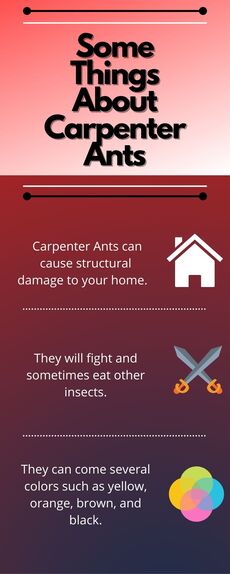 Do you ever see wet, soggy, or broken-down wood? Damaged or moist wood is a perfect place for carpenter ants to build their nest. They could be located in damaged wood, debris, or on top of that overhanging limb that touches your roof. Carpenter Ants can live inside or outside. Those dying decaying tree stumps? They can live there. The doorway in your home and your windows? They can live there too. It is important to remember that moist or damaged wood is a part of their optimal living conditions. Those woodworkers also will search for food, make rustling noises as they walk through your house, and pull shavings from the dusty wood along with them. They colonize in two different ways. They can be parent or satellite colonies. The parent colony is where workers and queens live. In satellite, colonies reside workers, larvae, and pupae. Satellite colonies exist because they need more space, food, or water. Carpenter Ant's DefensesCarpenter ants are capable of biting as well as releasing a chemical to protect themselves and their colony. Not only that but carpenter ants will fight other insects as well. For instance, they will fight termites. Termites and Carpenter Ants both use wood to live but in different ways. It only makes sense that they would eventually encounter each other. When they do encounter each other, carpenter ants would kill and sometimes eat enemy termites.
|
AuthorI really enjoy researching and writing about pests. The more we know about bugs, the easier it becomes to control them. Categories
All
Archives
February 2024
|
|
© 2021 Bug Ninja Pest Control.
All rights reserved. |
Services |
Contact |
|

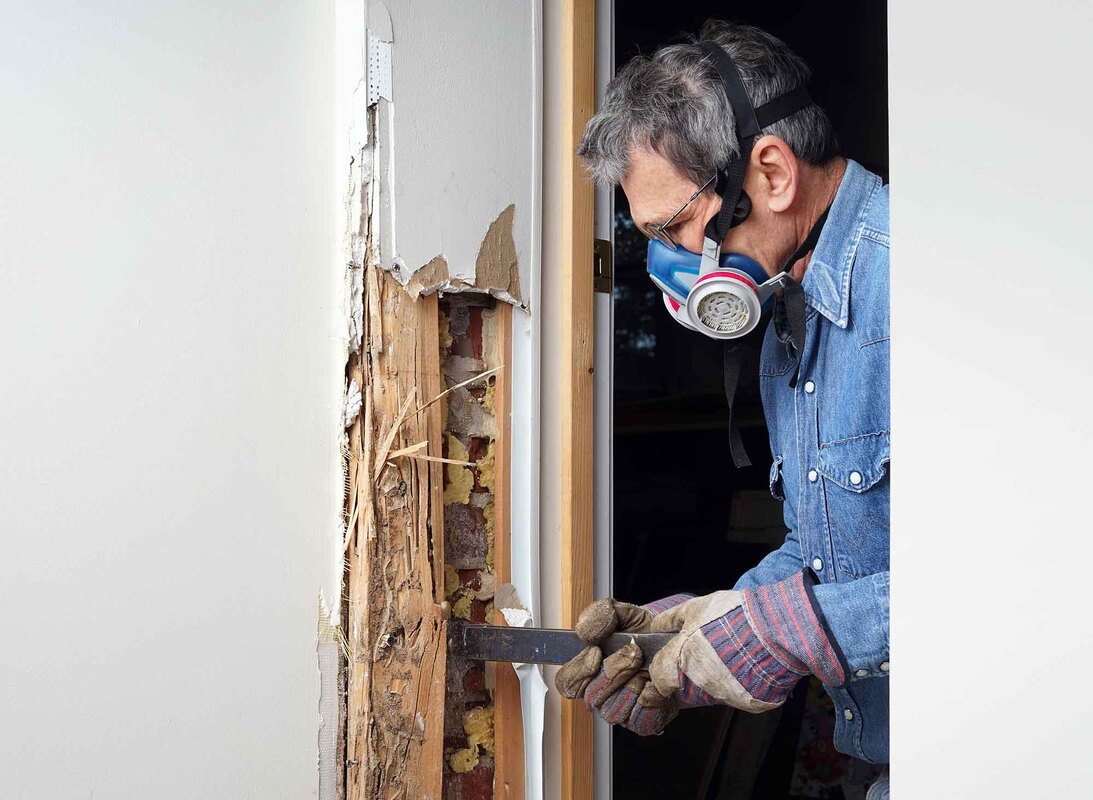
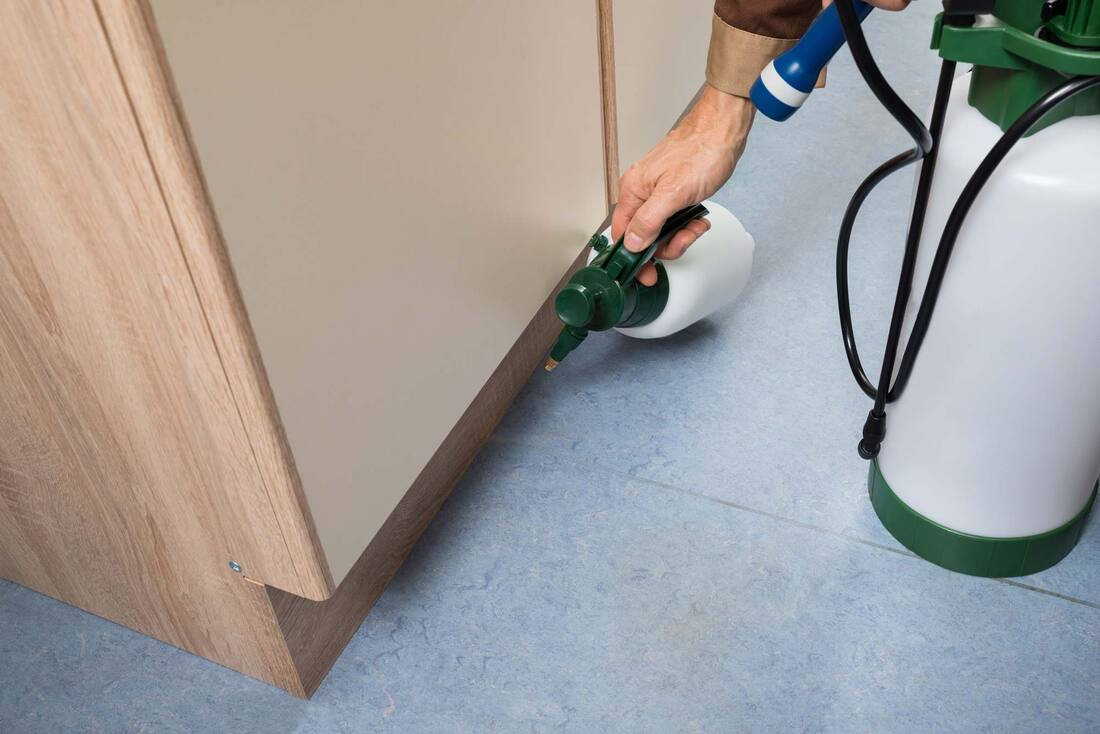
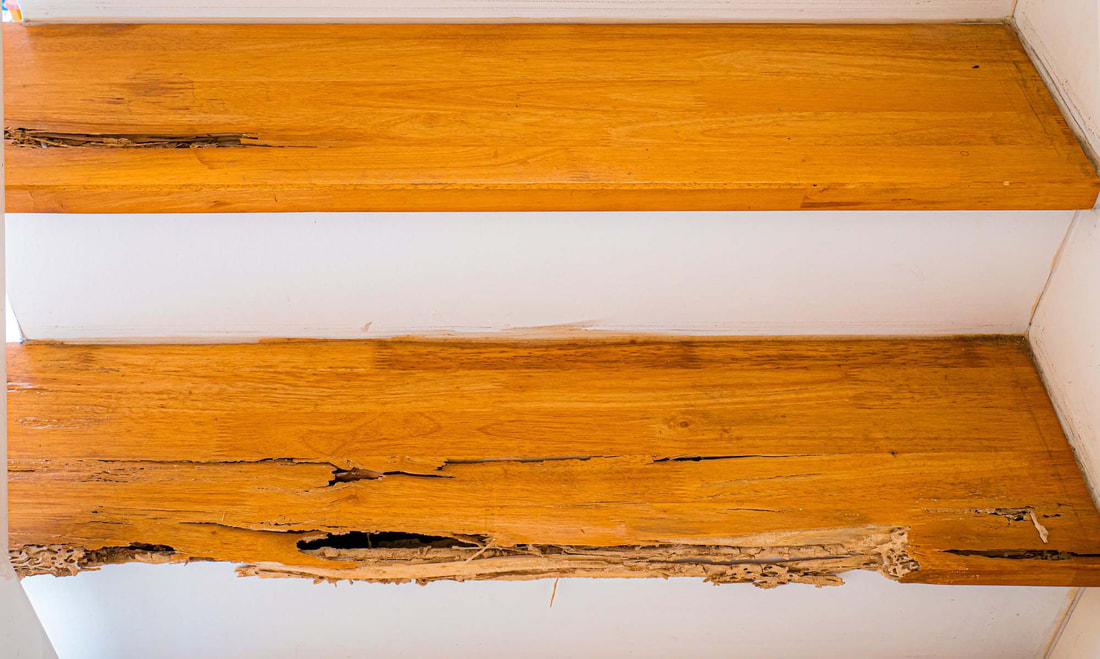
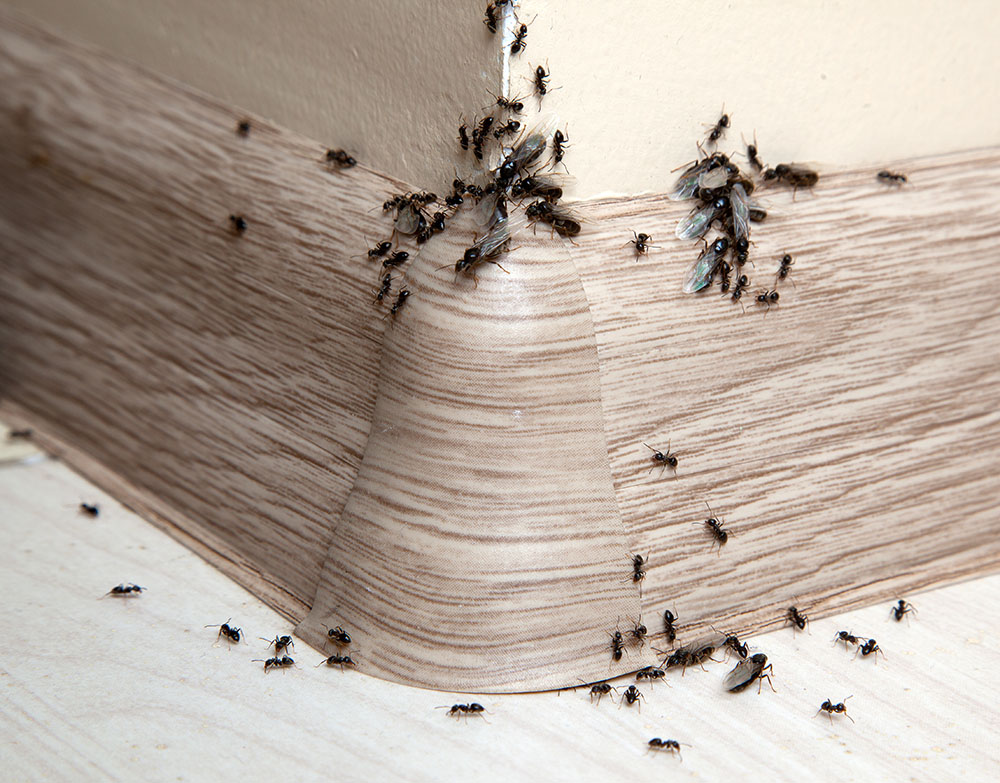
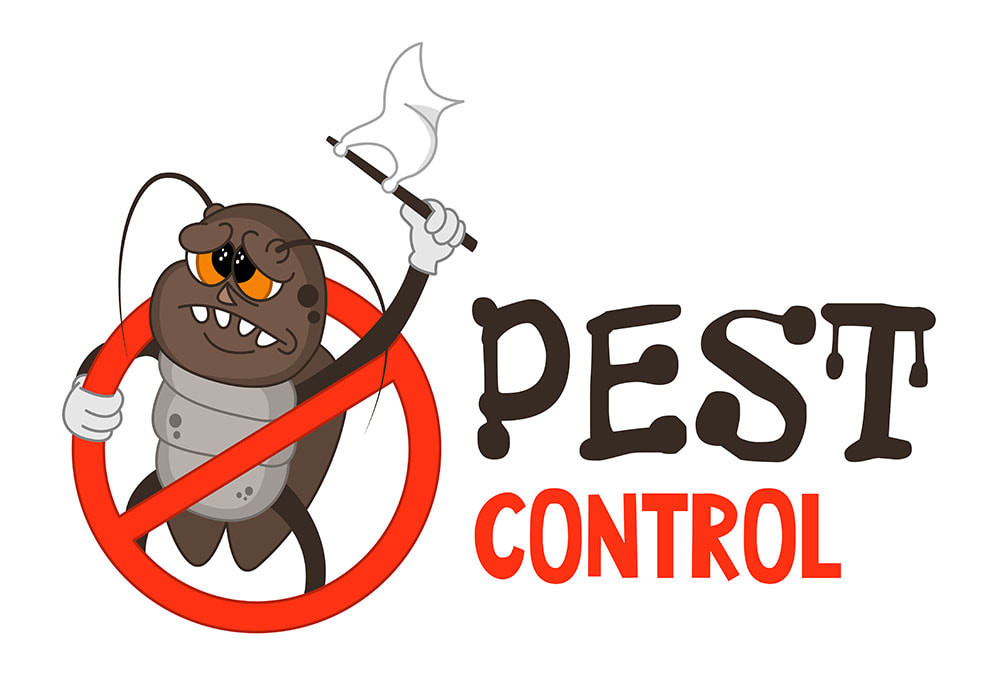
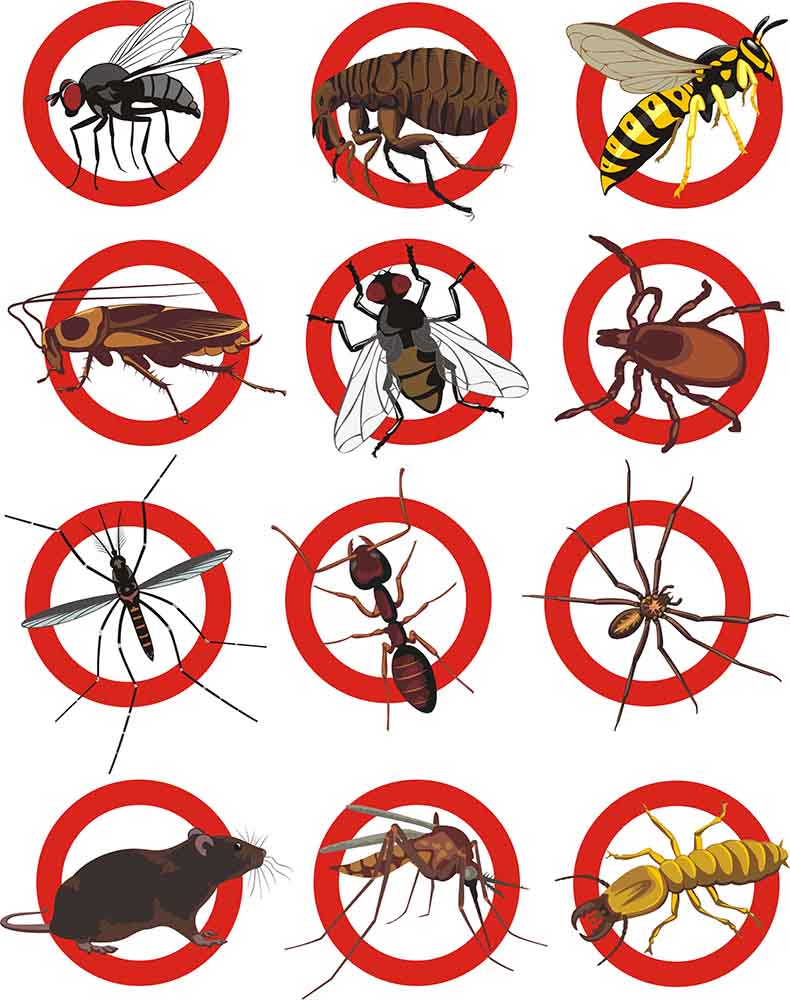


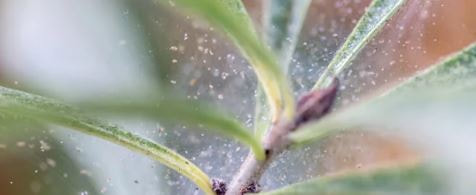
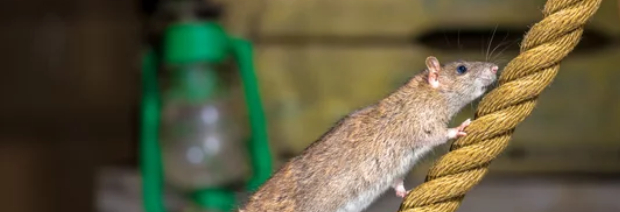
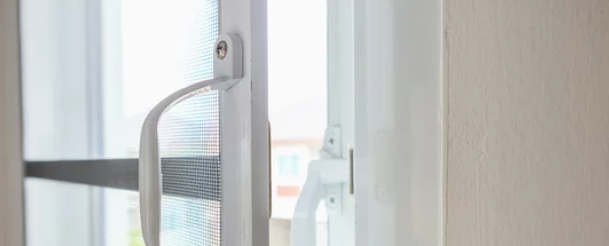
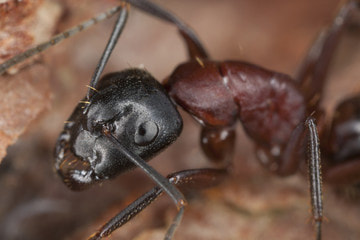

 RSS Feed
RSS Feed

